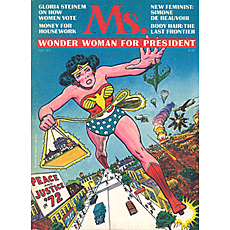
As I watched , I remembered the day that everything changed for me. Late June 1972. I was 17 and had just finished my first year of college. I was heading to Long Island with my mom to spend a day at the town pool near my aunt's home. We stopped at the newsstand at the Long Island Railroad station. I browsed through the magazines. The first newsstand issue of Ms. magazine caught my eye. The cover image of Wonder Woman accompanied by the headline "Wonder Woman for President" combined my newfound interest in politics with my life-long love of DC Comics characters. I bought it.
Ms. spoke to me. Its authors were writing what I was thinking — and making me aware of things I hadn't known enough about to have considered.
Growing up I had a 1960 board game "Tressy Career Girl Game." It must have been considered forward-thinking because it did involve careers for women, but the job options — stewardess, secretary, nurse, teacher, model, dancer or actress — seemed undesirable or unattainable. I wanted to use my brain, not my body as a model, dancer or actress. Stewardesses, secretaries and nurses all helped male pilots, executives and doctors do the "real" work. That left me with teacher as the only board game career I was ever willing to pursue.
Ms. looked beyond the "Tressy careers." It talked about political power; finances; and women controlling their bodies and their lives. Most of all, the editors and writers themselves were women I could emulate. I subscribed. I grabbed each issue when it arrived and eagerly perused its pages.
When I graduated from college in 1975, I had career and graduate school choices I had never conceived of four years earlier: economist or lawyer. I opted for lawyer.
In 2004, I attended a legal conference at which Gloria Steinem spoke. Afterward, I thanked her for Ms. and told her it changed my life. She looked back smiling and said quietly, "It changed mine too."
When I tell people that I work with the ACLU Women's Rights Project today, many look at me and say "Well, there's nothing to do in that area now. Women have their rights." To which I can only say, "yes, and no." In addition to the first issues of Ms., 1972 gave us Title IX, which prohibits sex discrimination in federally funded educational programs. It was also the year that now Supreme Court Justice Ruth Bader Ginsburg founded the ACLU Women's Rights Project and started an assault on laws that formalized male-female inequality. But discrimination and harmful stereotyping are still there even if more subtly played out.
The Wal-Mart sex discrimination class action litigation has taught us that even today, lots of folks in this country expect women to take lower-paying jobs while men get higher-paying supervisory positions.
Go to some public schools in this country and you will find boys and girls in separate classrooms because school administrators looking for a quick educational fix have been persuaded that boys and girls brains are so different that they belong in separate classrooms, being taught by separate methods, even though there is no actual scientific support for this proposition.
Roe v. Wade became "the law of the land," in 1973, but its principles have been so whittled away around the edges that abortion is not functionally available in many states. Countless pieces of legislation have been introduced around the country seeking to further limit abortion.
So yes, things have changed, and Gloria Steinem was frequently the most-heard voice advocating for the change. But much work still needs to be done for people to be treated as equals, and I am very happy that Gloria Steinem is still speaking out.
I still have my copy of that July 1972 Ms. I always considered it too valuable to throw away.
Learn more about women's rights: Sign up for breaking news alerts, , and .
